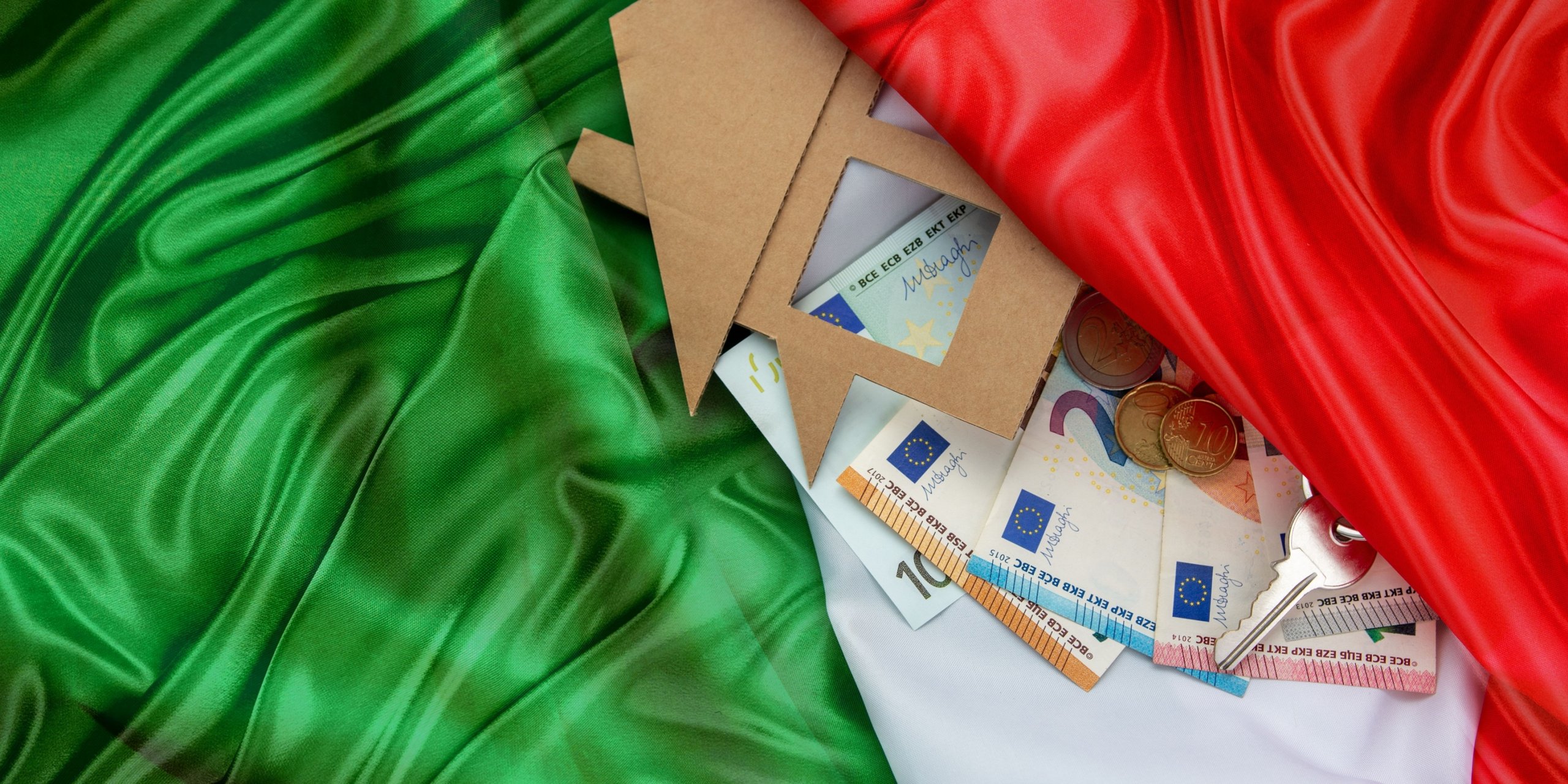Buying a property in Italy is a dream shared by many international buyers. Whether you’re picturing Lake Como views, a farmhouse in Tuscany or a seaside flat, the right financing is essential. The good news? Securing an Italian mortgage is possible for non-residents – and with the right preparation, the process can be both smooth and cost-effective.
In this guide, we’ll walk you through the types of mortgages available in Italy, explain the eligibility criteria, outline the application process and highlight the role of mortgage brokers. You’ll also learn about the documents you’ll need, how much you can borrow, relevant legal considerations and typical costs.
Contents
- Can foreigners get a mortgage in Italy?
- Types of mortgage in Italy
- How much can you borrow as a non-resident?
- Mortgage eligibility criteria
- What you’ll need to apply
- Steps in the mortgage process
- Using a mortgage broker in Italy
- Costs and fees to expect
- Final thoughts
Can foreigners get a mortgage in Italy?
Yes, non-residents can obtain mortgages from Italian banks and other lenders. Over recent years, many financial institutions in Italy have adapted their services to better support international buyers, removing the previous bias towards resident applicants.
Contact us to see your mortgage options
While foreign buyers once found it easier if they were already living in Italy, today banks are more open to assessing applications based on stable foreign income and verified supporting documents.
However, lenders remain cautious by international standards. They’re likely to ask for detailed proof of income, strong credit history and documentation that’s sometimes required in Italian and English. The process may take longer than you’re used to, but with the right help – particularly from a mortgage broker who speaks both English and Italian – it’s entirely manageable.
Importantly, owning property in Italy does not entitle you to residency. If you plan to spend significant time in the country, you will still need to check visa requirements.

Types of mortgage in Italy
Several mortgage types are available in Italy, and selecting the right one depends on your budget, income and goals. Here are the main options:
- Fixed-rate mortgage: Your interest rate is locked for the full term. Ideal if you want predictable monthly repayments. Rates are usually a little higher than variable deals but offer peace of mind – especially if you’re on a tight budget.
- Variable-rate mortgage: Linked to the Euribor, your monthly repayments move with economic trends. Often cheaper in the beginning but vulnerable to rises. A good choice if you’re financially flexible and expect rates to fall or stabilise.
- Mixed mortgages: Some banks offer modules that combine fixed and variable components or switch between them after a set number of years.
Many international buyers ask if “buy-to-let” mortgages exist in Italy. Unlike the UK and elsewhere, there is no specific mortgage category defined this way, offering interest only payments. You can use a standard mortgage to buy a property to rent out – though you must still meet the lender’s affordability requirements and follow local rental rules.
Before choosing a product, compare APRs (Annual Percentage Rates), flexibility, early repayment options and any penalties. A broker can help you analyse these aspects.
How much can you borrow as a non-resident?
Italian banks are conservative, especially when lending to foreign buyers. Most non-residents can borrow up to 60% of the property’s value. A few lenders may stretch to 70%, but you’ll usually need to demonstrate very strong credentials for that.
Here’s an overview of standard lending limits:
- Loan-to-value (LTV): 50% to 60% for non-residents.
- Minimum loan amount: Typically €100,000, though some rural lenders may accept lower amounts if conditions are met.
- Loan term: Up to 25 years. Borrowers must often repay the loan before they turn 75.
- Debt-to-income ratio (DTI): Generally your total monthly commitments, including your new mortgage, should not exceed 33% of your net monthly income.
Unlike in the UK, Italian banks do not use income multiples (e.g. four times annual salary). Instead, they calculate how much you can borrow based on your ability to cover monthly repayments after regular expenses and taxes. You’ll need to provide documentation that details all financial obligations in your home country.
Some international banks – including HSBC and BNP Paribas – also offer mortgages for Italian property if you hold accounts with them elsewhere. Conditions vary, so speak to a broker or bank representative for advice.
Bear in mind that you will need to add buying costs to the equation. These add about 10% to 15% to the purchase price and will not be included in the mortgage, so effectively meaning the mortgage may only add up to 40% t 50% of the purchase price.
Mortgage eligibility criteria
Anyone – whether employed, self-employed or retired – can apply for an Italian mortgage, so long as they meet the affordability checks and documentation requirements.
The typical criteria include:
- Proof of income: This may include payslips, tax returns, statements, or pension documents. Self-employed applicants will usually need at least two years of audited accounts.
- Consistency: Lenders look for stable, recurring income – ideally in euros, though other currencies are accepted by some banks.
- Age at maturity: Most banks won’t lend if the applicant will be older than 75 by the end of the mortgage term.
- Bank account in Italy: Almost always mandatory – your repayments will be made from this account.
Thankfully, residency is not a deal-breaker. You do not need to be living in Italy, but you do need to show that you’re financially secure and have a clean credit history. Some lenders also require your credit report from your country of residence, so be sure to check this in advance.
What you’ll need to apply
Mortgage applications in Italy can feel paperwork-heavy compared with other countries, but being organised makes a big difference. Here’s what you’ll likely need:
- Valid passport(s) – For all applicants.
- Codice Fiscale – This Italian tax code is essential for all financial transactions. You can get one via the Italian tax office or consulate.
- Proof of income – Such as recent payslips, tax returns or pension statements.
- Bank statements – A minimum of six months, showing regular income and your ability to save or manage money.
- Credit report – This may need to be a translated version from your home country.
- Initial property sales contract – Known as the preliminary agreement or compromesso.
- Proof of address – Utility bills or bank statements dated within the last three months.
If you apply as a couple, both applicants need to provide individual documents. Some documents (such as proof of employment or bank statements) may need to be translated and/or notarised, depending on your lender’s requirements.
Steps in the mortgage process
From your initial property search to receiving funds, here’s what to expect when applying for a mortgage in Italy:
- Research lenders or contact a broker – Get pre-approval if possible.
- Apply for your Codice Fiscale – Essential for any purchase.
- Gather your documents – Ensure everything is up-to-date and correctly translated.
- Select and reserve a property – Sign a preliminary contract with your agent or seller.
- Property valuation – The lender will send a surveyor to assess value and confirm loan suitability.
- Final mortgage approval – The bank issues a formal offer.
- Sign the mortgage and property deeds – In front of a notary (or notaio), who registers the purchase and loan.
The process can take anywhere from six to 12 weeks depending on how quickly your documents are processed. Always factor in time for translations, valuations, and legal steps.
Using a mortgage broker in Italy
You’re not legally required to work with a broker – but if you’re buying from abroad or don’t speak fluent Italian, doing so could save you time and money.
A good international mortgage broker will:
- Advise you on your eligibility
- Present competitive mortgage options from multiple lenders
- Help prepare your documents to meet Italian legal standards
- Recommend trusted notaries and even solicitors, where needed
- Speak to banks on your behalf and explain complex terms
You’ll also get clarity on how currency fluctuations could impact your repayments over time. Many brokers work closely with currency specialists who can help you lock in rates and transfer money efficiently.
Brokers typically charge a fee – often 1% to 2% of the loan amount – but this is usually declared upfront. Some may offer a fixed fee, particularly for straightforward applications.
Costs and fees to expect
On top of your deposit, there are several additional costs to account for when taking out a mortgage in Italy as a non-resident. Budget roughly 10–15% of the property price to cover:
- Notary fees: Required for drafting, witnessing and recording the sale and mortgage agreement. Expect €2,000–€4,000 depending on complexity.
- Mortgage registration tax: 0.25% for main residences or 2% for secondary homes.
- Bank fees: Arrangement fees typically around 1% of the mortgage amount.
- Broker fees: 1% to 2% of the mortgage, depending on your deal.
- Survey (perizia): A professional valuation, usually costs €250–€500.
- Translation and interpretation: Legal documents may need certified translation where applicable.
- Insurance: Italian lenders require fire and life insurance as a condition of the mortgage.
You should also consider using a currency exchange specialist. A sudden 2–3% shift in the exchange rate can add thousands to your final costs. Services such as forward contracts or rate alerts can help you plan ahead.
Final thoughts
Securing a mortgage in Italy may involve more red tape than back home, but with the right professional advice, it’s entirely achievable – and can open the door to your ideal lifestyle in one of Europe’s most beautiful countries.
Take things one step at a time: get pre-approved early, use a reputable broker, and work with experts who know the Italian system inside out. With this approach, you’ll protect your finances and avoid delays.
Ready to take your next step? Book a free consultation with our Italian property experts or download our Italy Buying Guide for more practical support.
Make your Italian dream a reality – and do it with confidence.









